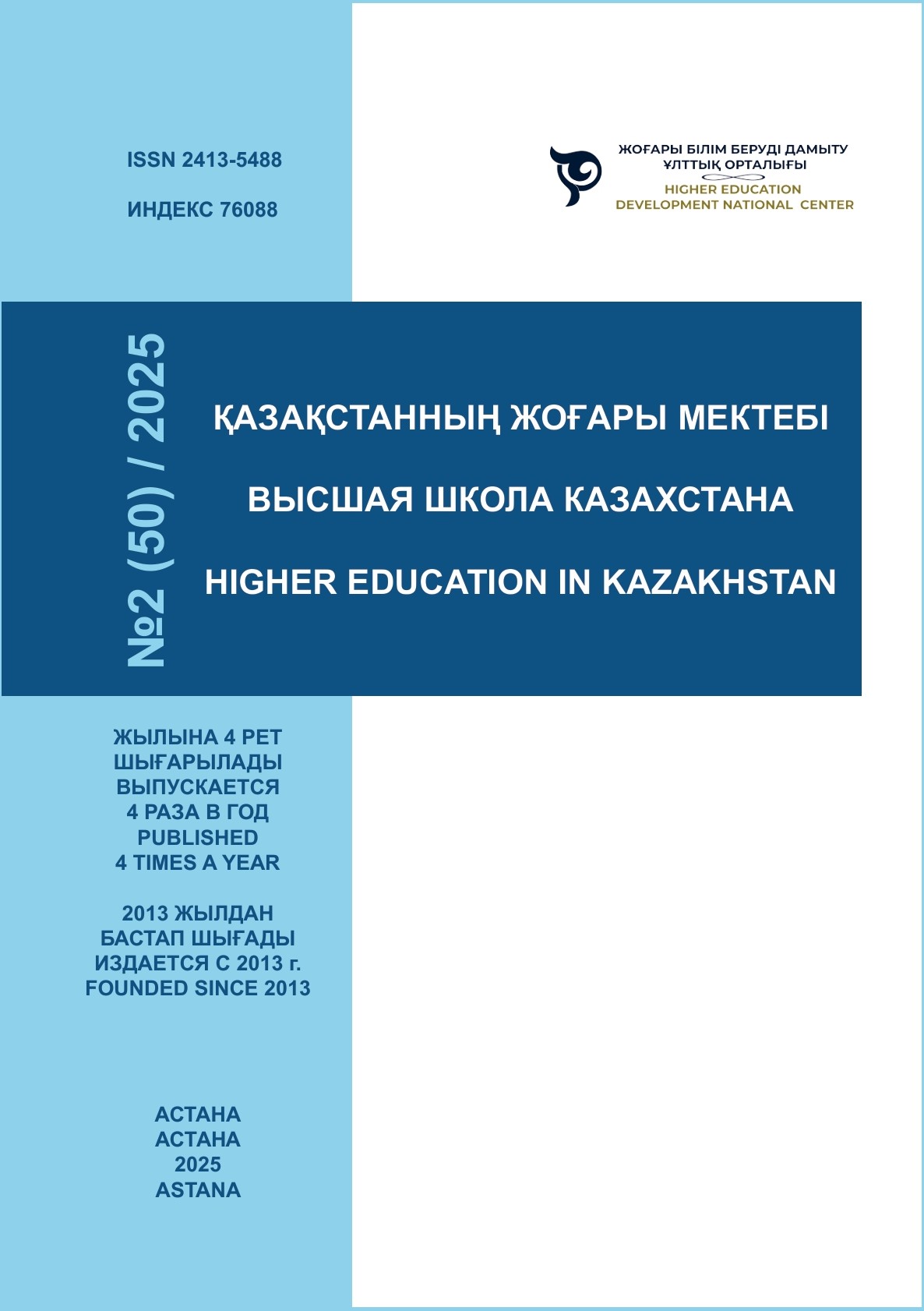DESIGN OF THE FRAMEWORK FOR STEM LANGUAGE TRAINING IN ENGINEERING EDUCATION
DOI:
https://doi.org/10.59787/2413-5488-2025-50-2-5-17Keywords:
STEM language training, research language skills, framework, scientific communication, engineering education, digital transformationAbstract
In the era of digital transformation and globalization of science, the development of scientific and professional language training technical specialists has a particular importance. The present study was carried out in the of implementation of the project “Enhancing scientific and professional language learning for engineering students in Kazakhstan through Digital Technologies” financed by the Science Committee of the Republic of Kazakhstan (Grant No. AP19678460). The research in the article is devoted to the analysis of modern approaches to the formation of scientific language literacy of STEM (Science, Technology, Engineering, Mathematics) students by means of digital technologies. In the research there has been presented the framework of STEM language training aimed at developing scientific literacy, academic writing skills, and effective professional communication among STEM students in the context of digital transformation. Key principles and approaches of STEM language training such as interdisciplinarity, digitization, practical orientation and research-based learning are considered. The study highlights the positive impact of language literacy in the STEM communication on research skills development of future engineers and effectiveness of the digital tools on the development of research language skills and suggests future research directions, including the integration of artificial intelligence into the educational process.
References
Asten, T. (2022). Discourse approach in teaching foreign language professional communication. E3S Web of Conferences. P: 1-8. DOI:10.1051/e3sconf/202236303046
Al Siyabi, J., Tuzlukova, V., Al Kaabi, K., etc. (2022). Assistive Technology in the English Language Classroom: Reality and Perspectives. Journal of Language Teaching and Research. 13(6), 1203- 1210. https://doi.org/10.17507/jltr.1306.08
Bagiyan,A.Y., Shiryaeva, T.A., Tikhonova, E.V., etc. (2021). The real value of words: how target language linguistic modelling of foreign language teaching content shapes students’ professional identity. Heliyon. 7, Issue 3,1-8. https://doi.org/10.1016/j.heliyon.2021.e06581
Cezzar, J. (2020). Teaching the Designer of Now: A New Basis for Graphic and Communication Design Education. She Ji: The Journal of Design, Economics, and Innovation. 6 (2), 213-227. ISSN 2405-8726. https://doi.org/10.1016/j.sheji.2020.05.002
Dell'Era, C., Magistretti, S., Candi, M., Bianchi, M., Calabretta, G., Stigliani, I., & Verganti, R. (2025). Design thinking in action: a quantitative study of design thinking practices in innovation projects. Journal of Knowledge Management. 29(11), 32-58. DOI:10.1108/JKM-04-2024-0424
Guaman-Quintanilla, S., Everaert, P., Chiluiza, K., & Valcke, M. (2023). Impact of design thinking in higher education: a multi-actor perspective on problem solving and creativity. International Journal of Technology and Design Education, 33(1), 217-240. DOI:10.1007/s10798-021-09724-z
Hrynevych, L. M., Morze, N. V., Vember, V. P., etc. (2023). Use of digital tools as a component of STEM education ecosystem. Educational Technology Quarterly. P. 1-22.
DOI: https://doi.org/10.55056/etq.24
Hubal, H., Siasiev, A., Sipii, V. (2024). Digital Technologies in the Process of Teaching STEM Disciplines: Challenges and Prospects. Cadernos de Educação Tecnologia e Sociedade. DOI:10.14571/brajets.v17.n1.445-458
Kreps, T. V. (2019). Interdisciplinary approach in research and teaching: advantages and problems of application. Scientific bulletin of the Southern Institute of Management. DOI:10.31775/2305-3100-2019-1-115-120
Le, H.C., Nguyen, V.H., Nguyen, T.L. (2023). Integrated STEM Approaches and Associated Outcomes of K-12 Student Learning: A Systematic Review. Educ. Sci. 2023, 13, 297. https://doi.org/10.3390/ educsci13030297
Maspul, K.A. (2023). Enhancing project-based learning in STEM education with integrated technology and coding. Journal of Intelligent Systems and Information Technology. P. 16-24. https://www.researchgate.net/publication/377767708_Enhancing_Project-Based_Learning_in_STEM_Education_with_Integrated_Technology_and_Coding
Mentsiev, A., Ashakhanova, M. Z., Almurzaeva, P. H. (2019). The impact of digital technology on the study of languages and the development of digital education. DOI:10.1088/1742-6596/1399/3/033085
Newton, R., Mutton, J., & Doherty, M. (Eds.) (2025). Transforming higher education with human-centred design. 1st Edition. https://doi.org/10.4324/9781003383161
Pérez, A., McClain, S. K., Roa, A.F., Rosado-Mendinueta, N. (2025). Artificial Intelligence Applications in College Academic Writing and Composition: A Systematic Review. Vol. 30 No. 1 (2025): January-April 2025 Issue / Literature Reviews. https://revistas.udea.edu.co/index.php/ikala/article/view/355878
Siemens, G. (2020). Connectivism: A Learning Theory for the Digital Age. International Journal of Instructional Technology. http://www.itdl.org/Journal/Jan_05/article01.htm
Tarasova, V.V. (2020). Development of academic literacy in foreign language teaching. Pedagogical Sciences. https://cyberleninka.ru/article/n/razvitie-akademicheskoy-gramotnosti-pri-obuchenii-inostrannym-yazykam
Trubina, Z. I. (2023). Development of flexible skills in foreign language teaching on the basis of modern pedagogical technologies. Historical and Pedagogical Journal No. 3. https://cyberleninka.ru/article/n/razvitie-gibkih-navykov-v-obuchenii-inostrannomu-yazyku-na-baze-sovremennyh-pedagogicheskih-tehnologiy
Ullrich, M., Houy, C., Stottrop, T. et al (2023). Automated Assessment of Conceptual Models in Education. Special Issue on Teaching and Learning Conceptual Modeling. https://doi.org/10.18417/emisa.18.2
Varianytsia, L., Kostiuk, O., Prodan, I., etc. (2022). Design Thinking as an Innovative Method of Formation of Creativity Skills in Students of Higher Education. Journal of Curriculum and Teaching 2022, 11 (8), 303-310, https://doi.org/10.5430/jct.v11n8p303
Ye, W. (2024). Enhancing English Language Education in Shenzhen Polytechnic University: Strategies for Effective Teaching and Learning. Creative Education, 15(2). DOI:10.4236/ce.2024.152014

Downloads
Published
Versions
- 2025-06-30 (2)
- 2025-06-16 (1)





